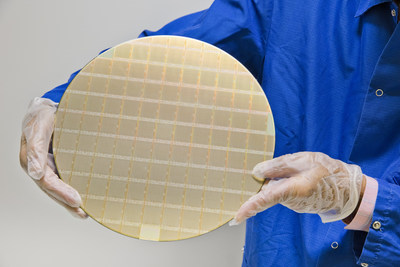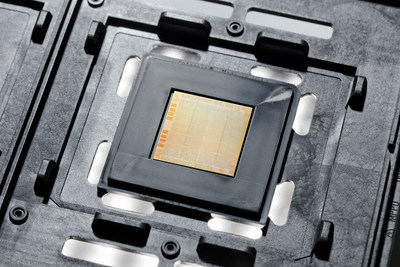New CPU co-optimized for Red Hat OpenShift for enterprise hybrid cloud
ARMONK, N.Y., Aug. 17, 2020 — (PRNewswire) — IBM (NYSE: IBM) today revealed the next generation of its IBM POWER central processing unit (CPU) family: IBM POWER10. Designed to offer a platform to meet the unique needs of enterprise hybrid cloud computing, the IBM POWER10 processor uses a design focused on energy efficiency and performance in a 7nm form factor with an expected improvement of up to 3x greater processor energy efficiency, workload capacity, and container density than the IBM POWER9 processor.1Designed over five years with hundreds of new and pending patents, the IBM POWER10 processor is an important evolution in IBM's roadmap for POWER. Systems taking advantage of IBM POWER10 are expected to be available in the second half of 2021. Some of the new processor innovations include:
- IBM's First Commercialized 7nm Processor that is expected to deliver up to a 3x improvement in capacity and processor energy efficiency within the same power envelope as IBM POWER9, allowing for greater performance.1
- Support for Multi-Petabyte Memory Clusters with a breakthrough new technology called Memory Inception, designed to improve cloud capacity and economics for memory-intensive workloads from ISVs like SAP, the SAS Institute, and others as well as large-model AI inference.
- New Hardware-Enabled Security Capabilities including transparent memory encryption designed to support end-to-end security. The IBM POWER10 processor is engineered to achieve significantly faster encryption performance with quadruple the number of AES encryption engines per core compared to IBM POWER9 for today's most demanding standards and anticipated future cryptographic standards like quantum-safe cryptography and fully homomorphic encryption. It also brings new enhancements to container security.
- New Processor Core Architectures in the IBM POWER10 processor with an embedded Matrix Math Accelerator which is extrapolated to provide 10x, 15x and 20x faster AI inference for FP32, BFloat16 and INT8 calculations per socket respectively than the IBM POWER9 processor to infuse AI into business applications and drive greater insights.
"Enterprise-grade hybrid clouds require a robust on-premises and off-site architecture inclusive of hardware and co-optimized software," said Stephen Leonard, GM of IBM Cognitive Systems. "With IBM POWER10 we've designed the premier processor for enterprise hybrid cloud, delivering the performance and security that clients expect from IBM. With our stated goal of making Red Hat OpenShift the default choice for hybrid cloud, IBM POWER10 brings hardware-based capacity and security enhancements for containers to the IT infrastructure level."
IBM POWER10 7nm Form Factor Delivers Energy Efficiency and Capacity Gains
IBM POWER10 is IBM's first commercialized processor built using 7nm process technology. IBM Research has been partnering with Samsung Electronics Co., Ltd. on research and development for more than a decade, including demonstration of the semiconductor industry's first 7nm test chips through IBM's Research Alliance.
With this updated technology and a focus on designing for performance and efficiency, IBM POWER10 is expected to deliver up to a 3x gain in processor energy efficiency per socket, increasing workload capacity in the same power envelope as IBM POWER9. This anticipated improvement in capacity is designed to allow IBM POWER10-based systems to support up to 3x increases in users, workloads and OpenShift container density for hybrid cloud workloads as compared to IBM POWER9-based systems. 1
This can affect multiple datacenter attributes to drive greater efficiency and reduce costs, such as space and energy use, while also allowing hybrid cloud users to achieve more work in a smaller footprint.
Hardware Enhancements to Further Secure the Hybrid Cloud
IBM POWER10 offers hardware memory encryption for end-to-end security and faster cryptography performance thanks to additional AES encryption engines for both today's leading encryption standards as well as anticipated future encryption protocols like quantum-safe cryptography and fully homomorphic encryption.
Further, to address new security considerations associated with the higher density of containers, IBM POWER10 is designed to deliver new hardware-enforced container protection and isolation capabilities co-developed with the IBM POWER10 firmware. If a container were to be compromised, the POWER10 processor is designed to be able to prevent other containers in the same Virtual Machine (VM) from being affected by the same intrusion.
Cyberattacks are continuing to evolve, and newly discovered vulnerabilities can cause disruptions as organizations wait for fixes. To better enable clients to proactively defend against certain new application vulnerabilities in real-time, IBM POWER10 is designed to give users dynamic execution register control, meaning users could design applications that are more resistant to attacks with minimal performance loss.
Multi-Petabyte Size Memory Clustering Gives Flexibility for Multiple Hybrid Deployments
IBM POWER has long been a leader in supporting a wide range of flexible deployments for hybrid cloud and on-premises workloads through a combination of hardware and software capabilities. The IBM POWER10 processor is designed to elevate this with the ability to pool or cluster physical memory across IBM POWER10-based systems, once available, in a variety of configurations. In a breakthrough new technology called Memory Inception, the IBM POWER10 processor is designed to allow any of the IBM POWER10 processor-based systems in a cluster to access and share each other's memory, creating multi-Petabyte sized memory clusters.
For both cloud users and providers, Memory Inception offers the potential to drive cost and energy savings, as cloud providers can offer more capability using fewer servers, while cloud users can lease fewer resources to meet their IT needs.
Infusing AI into the Enterprise Hybrid Cloud to Drive Deeper Insights
As AI continues to be more and more embedded into business applications in transactional and analytical workflows, AI inferencing is becoming central to enterprise applications. The IBM POWER10 processor is designed to enhance in-core AI inferencing capability without requiring additional specialized hardware.
With an embedded Matrix Math Accelerator, the IBM POWER10 processor is expected to achieve 10x, 15x, and 20x faster AI inference for FP32, BFloat16 and INT8 calculations respectively to improve performance for enterprise AI inference workloads as compared to IBM POWER9,2 helping enterprises take the AI models they trained and put them to work in the field. With IBM's broad portfolio of AI software, IBM POWER10 is expected to help infuse AI workloads into typical enterprise applications to glean more impactful insights from data.
Building the Enterprise Hybrid Cloud of the Future
With hardware co-optimized for Red Hat OpenShift, IBM POWER10-based servers will deliver the future of the hybrid cloud when they become available in the second half of 2021. Samsung Electronics will manufacture the IBM POWER10 processor, combining Samsung's industry-leading semiconductor manufacturing technology with IBM's CPU designs.
Read more about how IBM POWER10 is expected to impact the enterprise hybrid cloud market, here: https://newsroom.ibm.com/Stephen-Leonard-POWER10.
About IBM
For more information about IBM Power Systems visit: https://www.ibm.com/it-infrastructure/power
Red Hat, Red Hat Enterprise Linux, the Red Hat logo and OpenShift are trademarks or registered trademarks of Red Hat, Inc. or its subsidiaries in the U.S. and other countries. Linux® is the registered trademark of Linus Torvalds in the U.S. and other countries.
CONTACT:
Sam Ponedal
1 3X performance is based upon pre-silicon engineering analysis of Integer, Enterprise and Floating Point environments on a POWER10 dual socket server offering with 2x30-core modules vs POWER9 dual socket server offering with 2x12-core modules; both modules have the same energy level.
2 10-20X AI inferencing improvement is based upon pre-silicon engineering analysis of various workloads (Linpack. Resnet-50 FP32, Resnet-50 BFloat16, and Resnet-50 INT8) on a POWER10 dual socket server offering with 2x30-core modules vs POWER9 dual socket server offering with 2x12-core modules.
![]() View original content to download multimedia:
http://www.prnewswire.com/news-releases/ibm-reveals-next-generation-ibm-power10-processor-301112909.html
View original content to download multimedia:
http://www.prnewswire.com/news-releases/ibm-reveals-next-generation-ibm-power10-processor-301112909.html
SOURCE IBM
| Contact: |
| Company Name: IBM
Web: www.ibm.com Financial data for IBM |




